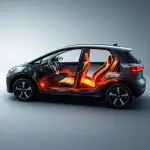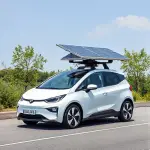Last Updated on November 23, 2022 by
A typical hybrid electric car can go 28 to 39 miles on a single charge.
However, this range may vary depending on the make and model of the car.
Hybrids offer competitive ranges without sacrificing their environmentally-friendly benefits.
How far can a hybrid car go without gas?
When it comes to plug-in hybrid cars, the question of the driving range is a valid concern for potential buyers. However, the answer may surprise you.
In most cases, hybrids can travel up to 300 miles on gasoline alone, making them suitable for long-distance driving.
While battery size may only suffice for 50 to 100 miles, hybrids can easily cover the same ground as conventional vehicle when gasoline kicks in.
This means that hybrid car owners can rest easily, knowing they won’t have to stop for gas during a road trip or commute.
How far can a hybrid go on a single charge?
The range of a hybrid vehicle depends on various factors, including driving style and the outside temperature with regenerative braking.
Generally speaking, hybrid vehicles can typically go about 50-60 miles on a single charge. However, some high-performance hybrids can travel up to 100 miles on a single full charge.
It is important to note that while hybrid vehicles use gas, they also rely on electricity for power instead of internal combustion engine.
This means that the distance traveled on electricity alone may not be as long as with traditional gasoline-only vehicles. Ev range, or electric cars, have even longer ranges on a single charge but require longer charging times and may not be practical for all driving situations.
It even comes with tax credits.
How far can an electric car travel on a single charge
Most electric cars can travel up to 250 miles on a single charge. This is because the latest models are outfitted with more powerful smaller batteries that allow for a longer range.
However, it’s important to note that the distance a car can travel on a single charge will vary depending on the make and model of the vehicle. For example, some electric cars can only travel 100 miles as range anxiety on a single charge, while others can travel up to 300 miles.
Do electric cars lose charge when parked?
It is a common misconception that plug-in electric vehicles like nissan leaf or volkswagen id
do not lose any charge when parked. However, it is essential to note that all electrical devices lose power over time, including electric cars.
The rate at which they lose this charge varies and can be affected by external factors such as temperature, age, and type of battery. In general, it is safe to say that electric vehicles will lose a small amount of charge while parked.
It is important to remember that regularly charging your vehicle and storing it in an area with consistent temperature can help minimize standby loss.
Every electric car owner should be prepared for some level of standby loss when their vehicle is parked. However, the environmental benefits of driving an electric car still far outweigh this minor inconvenience.
How many km can an electric car go?
The average electric car can travel approximately 194 miles, or 313 kilometers, on a single charge.
However, this number can vary depending on several factors, including the size and efficiency of the battery, driving habits, and road conditions.
For maximum efficiency, it is essential to plan and charge the battery before long trips and use energy-saving measures like smooth acceleration and avoiding idling.
Some models may also offer the option to switch to gas if necessary. Overall, electric cars have come a long way in increasing range and reliability, making them a viable choice for eco-conscious drivers who travel long distances.
Do hybrid cars work well in cold weather?
Hybrid cars have often been criticized for not performing well in colder climates, but recent advancements in hybrid technology have proven this concern to be outdated.
Hybrid batteries perform very well in extremely cold weather, and some hybrid models are explicitly designed to operate at low temperatures.
Hybrid vehicles may even have an advantage over traditional gas-powered cars in cold weather because their electric motors provide instant torque, allowing for better traction on icy roads.
So whether you live in a temperate climate or somewhere with frigid winters, investing in a hybrid car can still be a wise choice.
How far can a tesla electric car go?
A Tesla electric car can go up to 575 km (360 miles) on a single charge. That’s enough for most people’s daily driving needs, and it’s especially impressive considering that the Tesla is a luxury sports car.
The Tesla Model S or tesla model x is one of the best-selling electric cars in the world, and it’s easy to see why.
Not only does this car have amazing performance specs, but it also has a stylish design that sets it apart from other electric cars on the market.
If you’re in the market for an eco-friendly luxury sports car, the Tesla Model S should be at the top of your list.
Which hybrid car has the longest electric range?
The BMW i3 REx has a 126-mile maximum range and is the longest-range hybrid car currently on the market.
It can travel up to 97 miles on a single charge, and when its battery runs low, the engine kicks in to give it an additional 29 miles of range.
This car is perfect for those who want to reduce their environmental impact without sacrificing performance or convenience.
Plus, it’s packed with features like leather seats, heated front seats, automatic climate control, and a rearview camera.
How fast can an electric car go?
The top speed of an electric car can vary, depending on the vehicle’s specific make and model. Generally speaking, most modern electric cars have a maximum speed of around 110 miles per hour.
Of course, this also depends on factors such as the battery charge level and road conditions. However, it’s important to note that, in most cases, driving at higher speeds can significantly decrease the range of an electric car.
It may be technically capable of reaching high speeds, but it may not be practical or efficient.
The unique capabilities of each electric car should be considered when determining its maximum speed potential.
Which hybrid car has the longest electric range?
The BMW i3 REx has the longest electric range of any hybrid car. A 126-mile electric range can easily take you all around town without needing to stop at a gas station.
The BMW i3 is also a very eco-friendly car. It’s made with sustainable materials like bamboo and eucalyptus wood and doesn’t produce harmful tailpipe emissions.
How long does an electric car take to charge?
It depends on the model of the electric car and the type of charging station or gas pumps being used and if it has fast chargers. It takes approximately 40-kilowatt hours to charge an electric vehicle using a standard 110-volt outlet fully.
However, using a 220-volt outlet or public charging station can significantly reduce this charging time.
It’s important to note that not all electric cars are compatible with all types of public charging stations, so do your research before purchasing an electric vehicle.
What happens when a hybrid car runs out of battery?
If a hybrid car runs out of battery, the car will automatically switch over to using the ICE. The gasoline engine will then run and provide power to the car.
The larger battery will also start charging again, and when it is fully charged, the car will switch back to using only the electric motor.
How long does an electric car battery last?
The lifespan of an electric car battery can vary depending on the type of battery and how it’s used and maintained. Electric car batteries can last anywhere from 10 to 20 years.
It’s important to note that as the battery ages, its performance may decline and need to be replaced sooner. How often a battery needs to be replaced depends on factors like how frequently the car is used.
In any case, regular maintenance and care can help extend the life of an electric car battery. Owners need guidance from their car’s manufacturer or a qualified mechanic for specific information about their battery’s life expectancy and replacement options.
What is the disadvantage of a hybrid car?
- They are more expensive than traditional cars.
- They require a special kind of fuel and also lessen fuel costs.
- They can be more challenging to repair.
- The batteries need to be regularly replaced or recharged.
- They emit pollutants when driven in cities.
Hybrid cars vs electric cars – which is best?
It depends on your personal needs and preferences.
Electric cars are better for the environment and tend to be cheaper in the long run, while hybrid cars are more efficient and can provide better performance.
Ultimately, it comes down to what you value most and what type of driving you do most often.
What is the biggest problem with hybrid cars?
The biggest problem with hybrid cars is that they often have poor handling and are more complex than traditional gasoline-powered cars. This makes them less reliable and more expensive to maintain.
In addition, hybrids can be less efficient in cold weather because the kwh battery doesn’t work as well in the cold. And finally, hybrids tend to cost more money to buy than traditional gasoline-powered cars.
Key Takeaways
- A hybrid electric car can go about 5 miles on battery power before the gas engine kicks in.
- When the gas engine kicks in, the car will run like a gasoline-powered car.
- A hybrid electric car combines gasoline or diesel engine with an electric motor. The electric motor is powered by a battery recharged by the gas or diesel engine.
- The advantage of a hybrid electric power car is that it gets better fuel cell economy than a regular gasoline-powered car.
- Lavender Oil - February 2, 2025
- Electric Cars with Solar Panels On Roof: The Future of Sustainable Driving - January 29, 2025
- Best Cheapest Electric Car Reddit Comments - January 23, 2025








